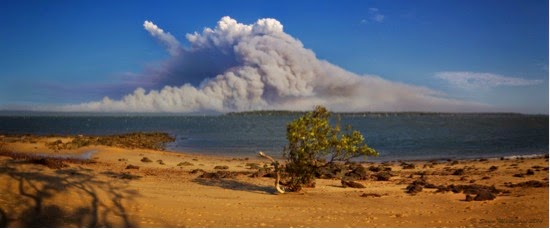Falling Back to Earth
Exhibition by Cai Guo-Qiang at GOMA to 11 May 2014
'It reminds me of this past week in parliament,' joked Queensland Arts Minister Ian Walker when he viewed Cai Guo-Qiang's installation titled Head On at GOMA's new exhibition, Falling Back to Earth. This mesmerising work features 99 wolves hurling themselves at a glass wall and perhaps Mr Walker saw it as a metaphor for the proclivity of politicians to make blind and foolish decisions.
Another, equally stunning installation is Heritage which was inspired by the artist's visit to Blue Lake on North Stradbroke Island in 2011. In surroundings of shadowless dreamy white, 99 wild animals from all parts of the world drink peacefully from a blue lake which is surrounded by pristine white sand. On one level the installation expresses the theme behind Cai's exhibition, which according to him is 'the return to a harmonious relationship between man and nature, re-embracing the tranquillity in the landscape.'
Certainly what is conveyed by this installation, albeit disquietingly, is a sense of stepping into a lost paradise, an experience Cai obviously shared with every other visitor who sees Straddie for the first time. In Chinese numerology, however, the number 99 symbolises something incomplete, something awaiting fulfilment, and Cai conveys this in a subtle way. The animals seem at peace but of course they are not animals, being merely constructions of polystyrene under hides of unknown provenance, and it is the unreality of the scene that gradually becomes the viewer's dominant impression. What you are looking at, the installation seems to say, is the ideal. It is not reality. As subtly insistent as the single drop of water that silently breaks the surface of the lake, the frozen tableau of beautiful endangered creatures made life-like by art confronts us with what we have lost in our environment and what we are yet to lose if we don't take action.
To judge by gallery visitors' responses, a similarly disquieting effect seems to have been produced by another installation titled Eucalyptus which is no more and no less than a magnificent upended gum-tree. On the wall alongside, on drawing-paper provided, one visitor's message says of the paper it was written on: 'This was a tree', while another one simply reads: 'Protect Stradbroke Island's lakes and wildlife. End sand-mining'.
An artist of international standing, Cai Guo-Qiang is no stranger to the Brisbane art scene, having produced a huge gunpowder-driven calligraphic serpent on paper in homage to the Brisbane River, as well as other installations for two Asia-Pacific Triennials. It is the mark of good art that it has the power to raise questions in the minds of its viewers and Falling Back to Earth is no exception to Cai's earlier work. You won't be disappointed by a trip to GOMA to ponder and wonder over his installations and what they suggest about our current relationship with our environment.
'It reminds me of this past week in parliament,' joked Queensland Arts Minister Ian Walker when he viewed Cai Guo-Qiang's installation titled Head On at GOMA's new exhibition, Falling Back to Earth. This mesmerising work features 99 wolves hurling themselves at a glass wall and perhaps Mr Walker saw it as a metaphor for the proclivity of politicians to make blind and foolish decisions.
Another, equally stunning installation is Heritage which was inspired by the artist's visit to Blue Lake on North Stradbroke Island in 2011. In surroundings of shadowless dreamy white, 99 wild animals from all parts of the world drink peacefully from a blue lake which is surrounded by pristine white sand. On one level the installation expresses the theme behind Cai's exhibition, which according to him is 'the return to a harmonious relationship between man and nature, re-embracing the tranquillity in the landscape.'
Certainly what is conveyed by this installation, albeit disquietingly, is a sense of stepping into a lost paradise, an experience Cai obviously shared with every other visitor who sees Straddie for the first time. In Chinese numerology, however, the number 99 symbolises something incomplete, something awaiting fulfilment, and Cai conveys this in a subtle way. The animals seem at peace but of course they are not animals, being merely constructions of polystyrene under hides of unknown provenance, and it is the unreality of the scene that gradually becomes the viewer's dominant impression. What you are looking at, the installation seems to say, is the ideal. It is not reality. As subtly insistent as the single drop of water that silently breaks the surface of the lake, the frozen tableau of beautiful endangered creatures made life-like by art confronts us with what we have lost in our environment and what we are yet to lose if we don't take action.
To judge by gallery visitors' responses, a similarly disquieting effect seems to have been produced by another installation titled Eucalyptus which is no more and no less than a magnificent upended gum-tree. On the wall alongside, on drawing-paper provided, one visitor's message says of the paper it was written on: 'This was a tree', while another one simply reads: 'Protect Stradbroke Island's lakes and wildlife. End sand-mining'.
An artist of international standing, Cai Guo-Qiang is no stranger to the Brisbane art scene, having produced a huge gunpowder-driven calligraphic serpent on paper in homage to the Brisbane River, as well as other installations for two Asia-Pacific Triennials. It is the mark of good art that it has the power to raise questions in the minds of its viewers and Falling Back to Earth is no exception to Cai's earlier work. You won't be disappointed by a trip to GOMA to ponder and wonder over his installations and what they suggest about our current relationship with our environment.
Reviewed by Julie Kearney

